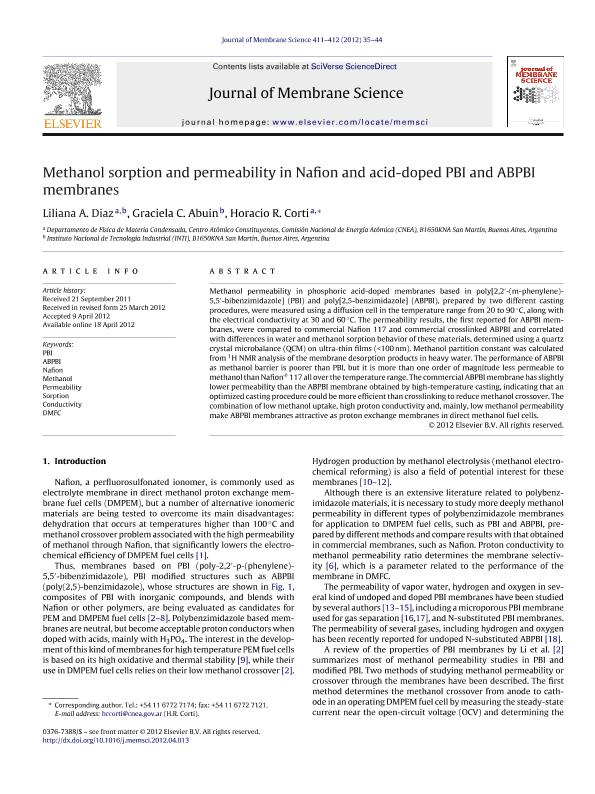Artículo
Methanol sorption and permeability in Nafion and acid-doped PBI and ABPBI membranes
Fecha de publicación:
04/2012
Editorial:
Elsevier Science
Revista:
Journal of Membrane Science
ISSN:
0376-7388
Idioma:
Inglés
Tipo de recurso:
Artículo publicado
Clasificación temática:
Resumen
Methanol permeability in phosphoric acid-doped membranes based in poly[2,2'-(m-phenylene)-5,5'-bibenzimidazole] (PBI) and poly[2,5-benzimidazole] (ABPBI), prepared by two different casting procedures, were measured using a diffusion cell in the temperature range from 20 to 90°C, along with the electrical conductivity at 30 and 60°C. The permeability results, the first reported for ABPBI membranes, were compared to commercial Nafion 117 and commercial crosslinked ABPBI and correlated with differences in water and methanol sorption behavior of these materials, determined using a quartz crystal microbalance (QCM) on ultra-thin films (<100nm). Methanol partition constant was calculated from 1H NMR analysis of the membrane desorption products in heavy water. The performance of ABPBI as methanol barrier is poorer than PBI, but it is more than one order of magnitude less permeable to methanol than Nafion ® 117 all over the temperature range. The commercial ABPBI membrane has slightly lower permeability than the ABPBI membrane obtained by high-temperature casting, indicating that an optimized casting procedure could be more efficient than crosslinking to reduce methanol crossover. The combination of low methanol uptake, high proton conductivity and, mainly, low methanol permeability make ABPBI membranes attractive as proton exchange membranes in direct methanol fuel cells.
Palabras clave:
ABPBI
,
CONDUCTIVITY
,
DMFC
,
METHANOL
,
NAFION
,
PBI
,
PERMEABILITY
,
SORPTION
Archivos asociados
Licencia
Identificadores
Colecciones
Articulos(SEDE CENTRAL)
Articulos de SEDE CENTRAL
Articulos de SEDE CENTRAL
Citación
Díaz, Liliana Alicia; Abuin, Graciela Carmen; Corti, Horacio Roberto; Methanol sorption and permeability in Nafion and acid-doped PBI and ABPBI membranes; Elsevier Science; Journal of Membrane Science; 411-412; 4-2012; 35-44
Compartir
Altmétricas




